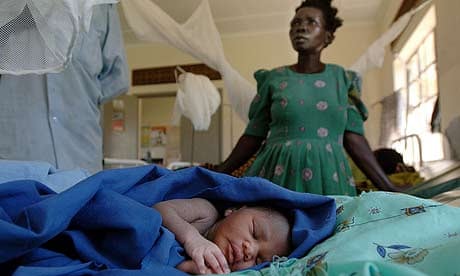The lives of a third of the women who die in childbirth could be saved if a cheap and common drug to prevent haemorrhage, together with antibiotics, were readily available in their villages, according to a paper published in one of the world's top medical journals, the Lancet.
If Aids has been battled into something of a corner – with HIV infection levelling off in some poor countries – it has much to do with the noisy global campaign to get antiretroviral drugs to millions of people in Africa. Mathematician Dr Christina Pagel and global health specialist Anthony Costello, from University College London, believe a roll-out of much more common, cheap and simpler pills to communities in Africa and Asia would have a dramatic impact on the death rates among mothers.
Deaths in childbirth are a major focus now of the global health community, and a cause championed by the British prime minister, Gordon Brown, at the UN last week. Brown is pushing for free healthcare in poor countries, which would save the lives of many impoverished women and children.
The focus of the safe childbirth movement is on improving and increasing care in clinics and maternity units. That is hugely important, argue Pagel and Costello, but in remote areas like Katine, in north-east Uganda, where the healthcare facilities are inadequate, badly stocked or too distant, thousands of lives could be saved if efforts were made to ensure the basic, cheap drugs were accessible.
Their paper is a mathematical model. Costello says he has been arguing for many years that a trial was needed, but has not been able to secure funds. The statistics, from Pagel, have convinced the Lancet's editor, Richard Horton, however, who wrote in an editorial that the approach "has the potential to transform our attitudes to maternal health. We might now be able to contemplate donor-funded drug-delivery programmes, akin to those available for HIV/Aids and tuberculosis, in addition to health facility strengthening. Such a strategy might radically alter the prospects for pregnant women in low-income settings."
The basic drugs are antibiotics to stop deaths from sepsis – blood poisoning as a result of infection during childbirth – and misoprostol, a pill that will make the uterus contract if taken after the delivery of the placenta, preventing haemorrhage. In the UK, women are usually given an injection of oxytocin for the same purpose.
Sepsis and haemorrhage are the main reasons women die in childbirth in Katine - where the Guardian is supporting a development project implemented by the African Medical and Research Foundation - and elsewhere in the developing world. The World Health Organisation says 9% to 10% of deaths in childbirth in Africa are due to sepsis. All the African obstetricians Costello has spoken to say it is closer to half. "Why is it that Bangladesh and Nepal have halved their maternal mortality rate in the last 15 years, but have got very low rates of attended delivery?" he asks. "The answer is that you can't walk more than a few hundred yards in Bangladesh without a man trying to sell you an antibiotic." Traditional birth attendants hand them out readily to women at the slightest sign of infection.
The mathematical model in the Lancet has, nonetheless, been constructed on very conservative premises, using accepted figures. Pagel and Costello look at Malawi, where it is illegal to sell antibiotics to the public, and calculate the impact of three different strategies for making the drugs more available. All three, they emphasise, are in addition to health system strengthening and not an alternative.
Package one proposes ensuring that all health facilities have oxytocin – the drug we have in the UK – to prevent haemorrhage, and antibiotics. Often, as in Katine, hospitals and health centres suffer stock-outs.
Package two envisages pregnant women being given misoprostol tablets – with instructions on how and when to take them – when they go for check-ups at antenatal clinics. Community health workers would also have supplies of antibiotics to give any woman who has given birth who shows signs of post-natal infection.
Package three is the most radical. In addition to all that would be happening in the health centres, volunteer village health workers would be given stocks of misoprostol and antibiotics to hand out to women who needed them.
Across sub-Saharan Africa, 182,000 women die from haemorrhage or sepsis each year. The authors calculate that the first package could prevent 21,300 (12%) deaths, the second could prevent 43,800 (24%) deaths and the third could prevent 59,000 (32%).
"It is only a model, but we're saying if you want to reach the poorest women, where most of the deaths are, this seems to be a valuable approach," said Costello.
